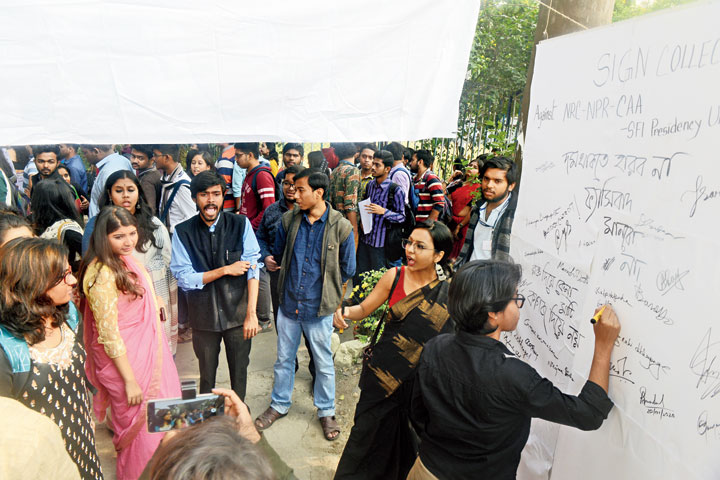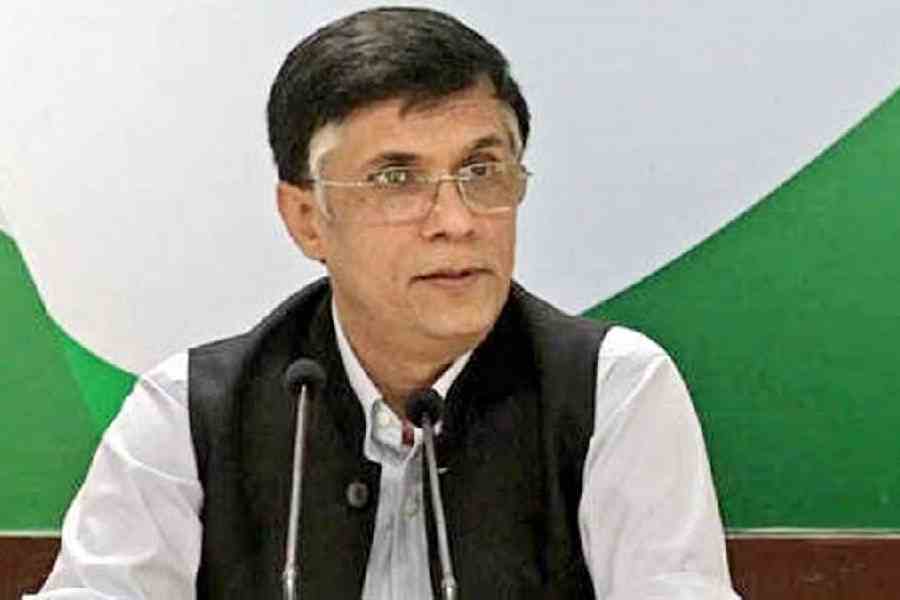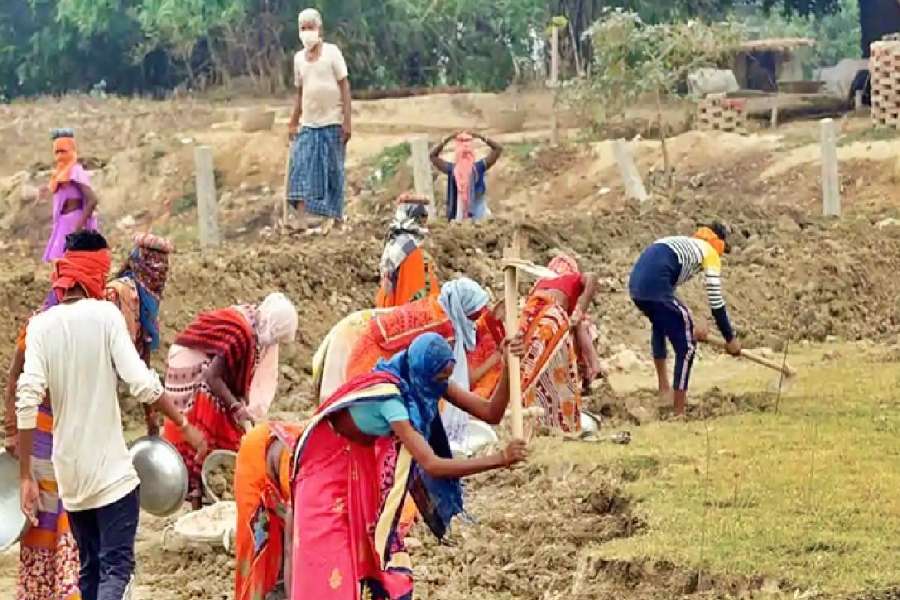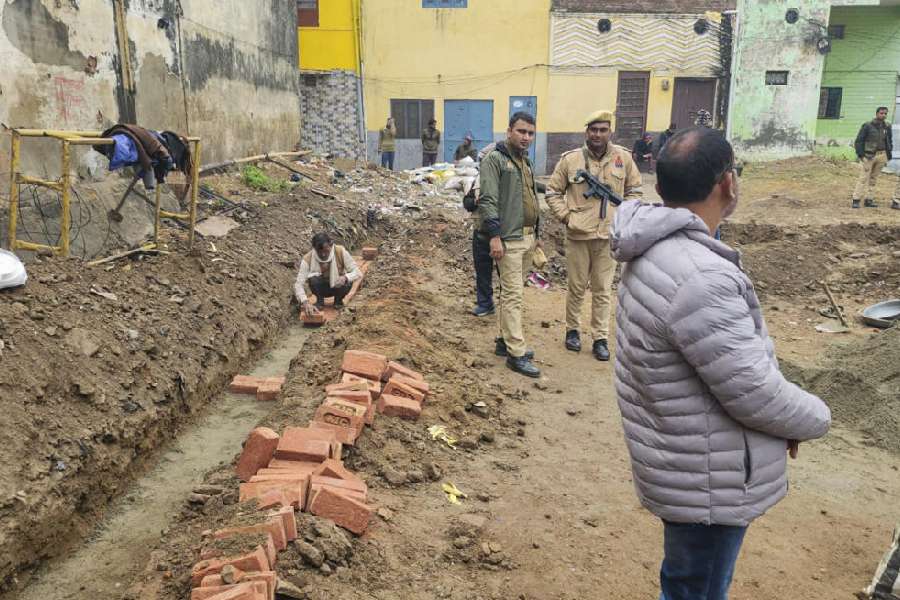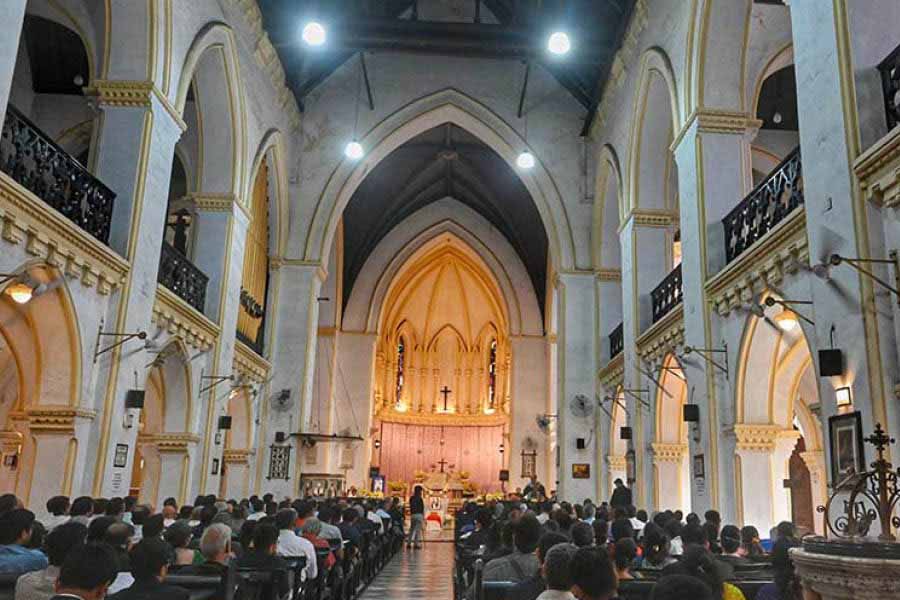Presidency students past and present came together on the campus to protest the Citizenship (Amendment) Act and the National Register of Citizens in keeping with what a former student said the “Derozian spirit” that celebrated defiance of social norms.
Hundreds of people assembled at the College Street institution on the occasion of the 203rd founders’ day and signed a campaign wall “against CAA, NRC and NPR (National Population Register)”.
The students called it the “democratic wall”.
Among those who signed were former Bengal home secretary Prasad Ranjan Roy, who said it was not clear why the law was introduced.
“People of our generation don’t have birth certificates. We came to Calcutta and studied in school. We have got certificates from school. We have worked in the state government with these certificates. Now, if someone says you have to produce land documents of your forefathers, I won’t be able to do that,” said Roy, who graduated in physics from then Presidency College in 1968.
Present and former students of Presidency signed a campaign wall against the Citizenship (Amendment) Act, National Register of Citizens and the National Population Register on the occasion of the institute’s founders’ day on Monday. They shared with The Telegraph what prompted them to sign the wall of protest
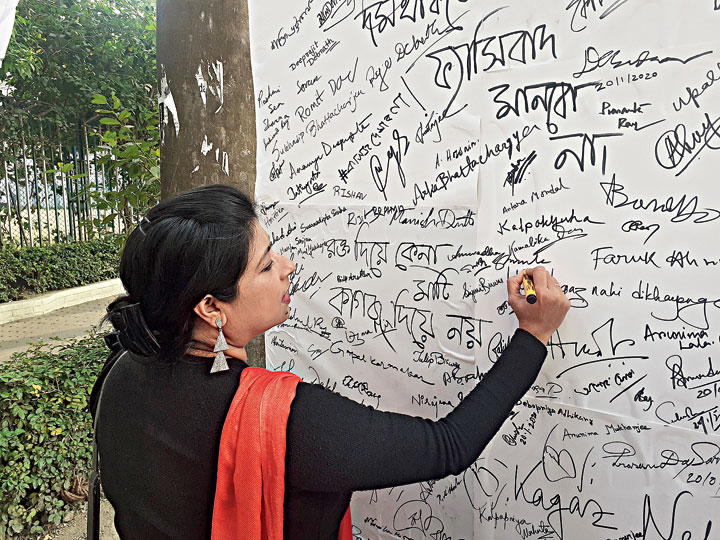
Anuradha Ghosh, a teacher of English at Dinabandhu Andrews College Pictures by Bishwarup Dutta
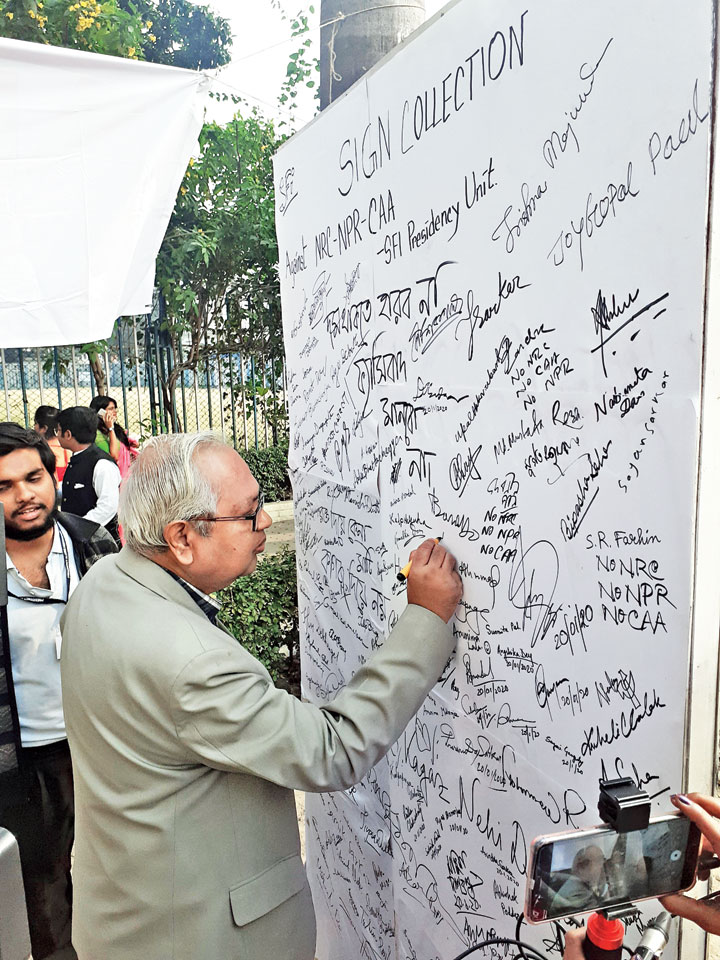
Former Bengal home secretary Prasad Ranjan Roy signs the wall
Another signatory was Prashanta Ray, a professor emeritus in sociology and an alumnus. “There is an attempt to change the cultural identity of India. The consequences of that effort would not be very happy. I dread a bloody end to this attempt at forging a majoritarian state,” he said.
The protest wall was put up outside an auditorium named after Henry Louis Vivian Derozio, where the founders’ day programme was held.
I am opposed to this concept of the CAA and NRC. There are also practical reasons. I have a domestic help who does not have any paper. Ever since the Centre created a buzz around the NRC, she has been fearing that she would lose her home and identity. She has fallen sick because of the constant anxiety. Those in power won’t understand how harried are the poor, no matter what their religion is.
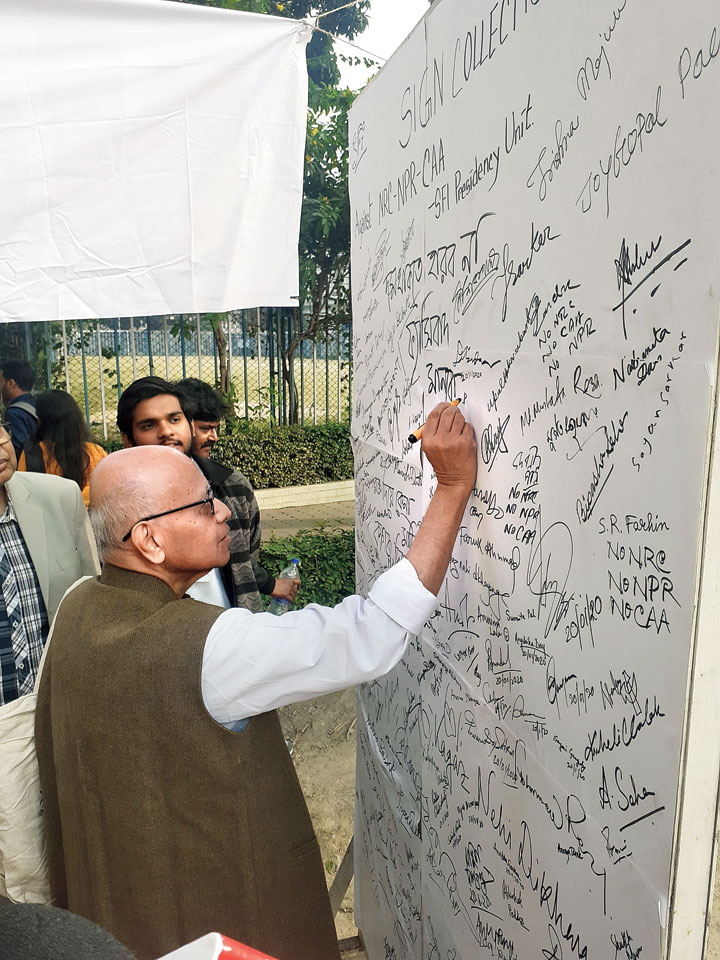
Prashanta Ray, a professor emeritus in sociology and an alumnus signs the wall
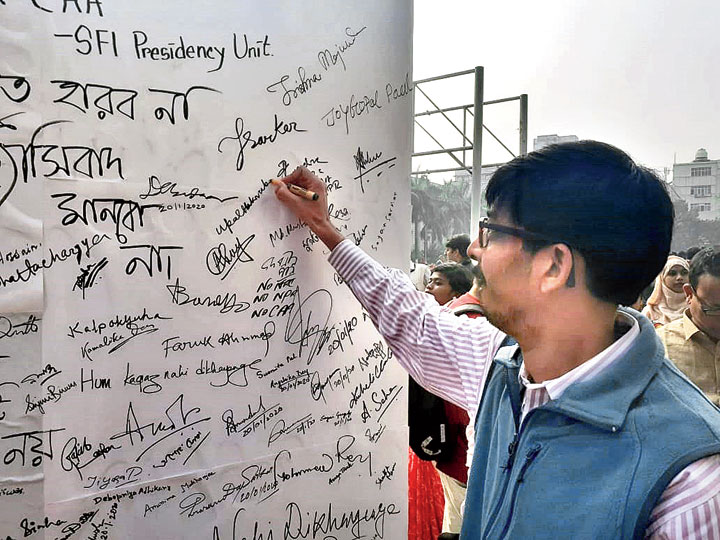
Upal Chakrabarty, teacher of sociology at Presidency University
Derozio — who had taught at Hindoo College, which became Presidency College — encouraged his students to question the authority, Ray said.
“As hundreds of students and former students signed the campaign, they lived up to this Derozian spirit of defiance. They have dared to ask what was the need for enforcing the divisive law.”
In May 1826, at the age of 17, Derozio had been appointed a teacher of English literature and history at Hindoo College. He used to organise debates where established ideas and social norms were freely roasted.
Derozio’s activities brought about an intellectual revolution in Bengal. Along with his band of young followers, he had launched what came to be known as the Young Bengal Movement.
Amartya Sen had in January 2017 said about the influence of Derozio on Presidency: “The person in whose memory this hall is named, Derozio, who was a Eurasian — a mixture of Indian and Portuguese parentage — was staunchly a non-believer and he presented classes here in this institution, still called the Hindoo College, which is now of course the Presidency College, in which he disputed the general beliefs of all religions.... In many ways, these are the great elements of heritage that the college carries.”
Ray recounted Presidency’s protests against the erstwhile Left Front government’s policies and the questions raised by leaders of the Naxalite movement.
“During the height of the Left Front, when the government was accused of taking steps that could hurt the glorious institution, Presidency students and teachers had protested. They denounced those attempts and fought for the autonomy of the institution. There was an attempt to question the authorities even during the Naxalite movement,” Ray said.
The Centre has to make a massive investment if it has to carry out an exercise such as the NRC. I think, given the extent of unemployment and the miserable state of affairs prevailing in the social sector, there is no justification for investing public money in projects like NRC. Since the NRC is linked with the CAA, there is a clear attempt to impose a majoritarian view on the people and this cannot be supported.
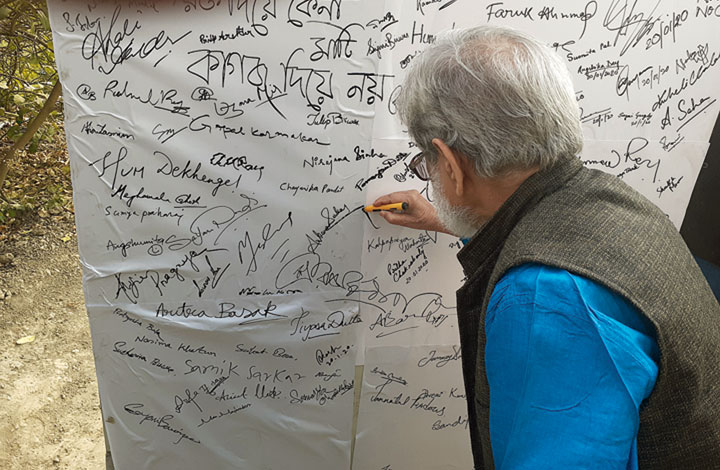
Veteran theatre director Bibhash Chakraborty signs the wall
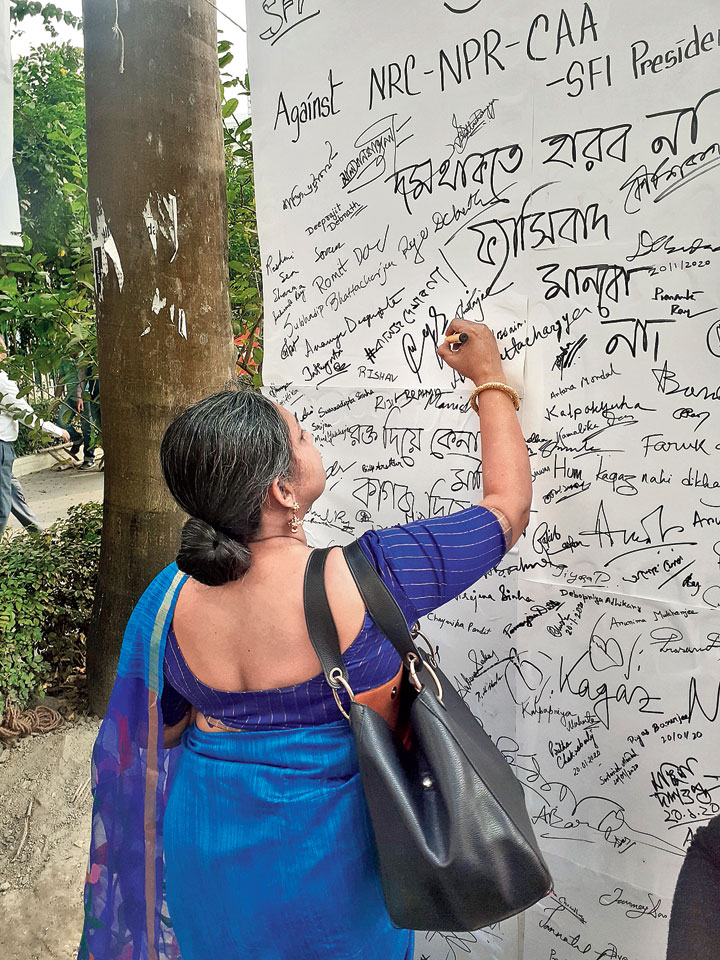
Kathakali Jana, works at Sangeet Research Academy
The state has no business dealing with any religion. It should stay away from religion as much as possible. That is the essence of secularism. The state should only focus on the welfare of the people. But once you try to give citizenship based on one’s religion, you attempt to strike at the root of secularism. We cannot allow this.
Veteran theatre director Bibhash Chakraborty was the chief guest at the founders’ day programme. The 1957 geography graduate was also among those who signed on the wall.
“The BJP thinks that just because it has won the elections, it can enact laws without taking people into confidence. But this is not the spirit of a democracy,” said Chakraborty.
Kaushiki Dutta Chowdhury, an undergraduate student, said they wanted to use the founders’ day platform to scale up their protest. “The campuses are now spearheading the protest against the divisive policies of the government,” she said.
Prasad Ranjan Roy said the Centre’s policies were “hitting many directly. This cannot be accepted. It is a matter of regret that the Opposition parties are not uniting to resist it.”
Among the alumni, the first to sign the protest wall was Sugata Majumder, a former bank employee, and his teacher A.K. Roy, who had taught geology at the erstwhile Presidency College.
“I cannot accept this new citizenship law. Muslims have stayed in India by choice, not by chance. You cannot do anything that potentially harms them,” said Majumder.
Roy, who had taught at the college from 1965 to 2003, said there were enough acts to grant citizenship to the displaced. “The new law is completely unnecessary. It has been brought only to divide the people.”
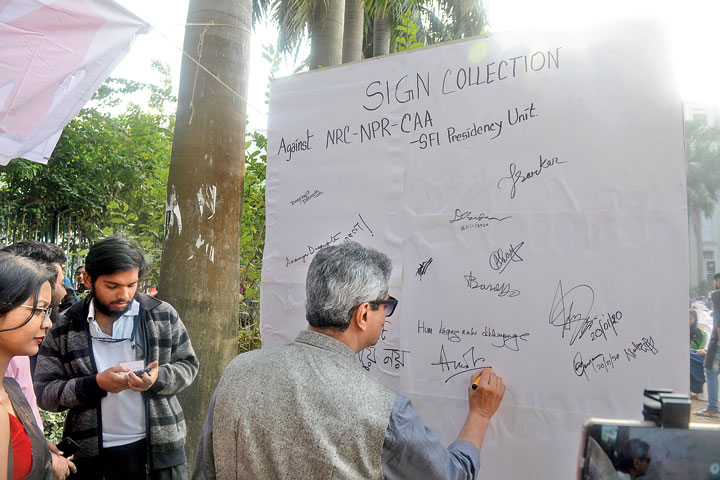
Amit Choudhury, IT professional
In a democratic country, the state cannot decide whimsically who it is going to exclude from citizenship. The acts like the CAA and NRC are arbitrary and religion cannot be the basis for granting citizenship. I have walked in rallies to voice my protest. On Monday, I participated in a signature campaign at my alma mater to register my opposition to what is happening.

